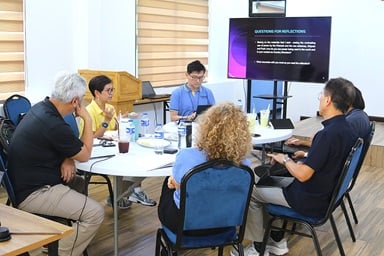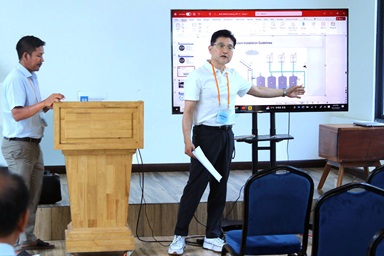When states commit human rights violations, it’s often women who must find a way to pick up the pieces and hold their families together.
A United Methodist deaconess has documented the experiences of the women relatives of those victimized by human rights violations, including how those women fought for justice.
Darlene Marquez-Caramanzana received the fifth Lourdes Lontok-Cruz Award from the University of the Philippines Center for Women’s Studies and the UPCWS Foundation Inc. She is the executive on ecumenical education and nurture for the National Council of Churches in the Philippines.
Her thesis, “Women Confronting State-instigated Violence: Experiences of Female Relatives of Victims of Human Rights Violations in the Philippines,” was judged “best thesis in women’s and gender studies.” It was presented in a lecture series on “Women in the Revolutionary Struggle” at the University of the Philippines. The lectures commemorated International Women’s Month in March.
Widening the human rights perspective on violence against women, Marquez-Caramanzana said the study included women’s accounts of violence as experienced through state forces, agencies and personnel.
Listening to women
“It also surfaced accounts of experiences of female relatives of victims of human rights violations, especially the wives, mothers, daughters or sisters,” she said. “It documented the empowerment and transformation process undergone by the female relatives and their subsequent actions to engage in seeking justice for victims.
“All the women were deeply pained and suffered from anguish upon the victimization of their loved ones. They related that the violation caused them mental torture, anger, confusion, feeling of helplessness, uncertainty and insecurity,” Marquez-Caramanzana continued.
She interviewed women who are mothers, daughters, wives of victims of extra-judicial killings and enforced disappearances.
Marquez-Caramanzana called participants who provided firsthand information “research partners.” They were female relatives of those “who were enforcedly disappeared and extra-judicially killed,” she added.
“I listened to their stories,” she said. “We were comfortable with each other.” Marquez-Caramanzana also interviewed human rights activists and workers who knew the women and reviewed of cases of human rights violations.
Valuing human dignity
Through the feminist research process, Marquez-Caramanzana stressed the need to give women the opportunity to affirm the accuracy of their stories.
“I realized how important small details are for women and how keen we should be in presenting them accurately,” she said. “This is because, in truth, women stories have been maligned and rendered as ‘untruths.’ …. My research partners have been maligned by the state and its institutions.”
For Marquez-Caramanzana, the project intensified her passion to value human dignity.
“This was strengthened and further affirmed,” she said, “when I began working in an ecumenical institution of mainline Protestant and non-Roman Catholic churches — the National Council of Churches in the Philippines.
“Because of its human rights program,” she continued, “I found myself listening to various stories and accounts of mothers, daughters, sisters and friends of human rights advocates who have been killed, abducted, tortured or illegally arrested. I heard them tell their stories to different audiences in different times and circumstances.”
Marquez-Caramanzana added, “We always say that women are at the margins and rightly so because their objective conditions speak of marginalization, domination and exploitation.
Acknowledging that women’s lived realities are different and unique, she said their struggle for liberation is not separate from that of the needy, the poor and the afflicted.
Marquez-Caramanzana said the research convinced her “that my place in this world is to be in the service of the marginalized, the poor and the oppressed — with women’s rights advocacy as one of the foci of my work and vocation.
“I know deep within that they also experience tiredness, uncertainty and rage,” she added. “But the capacity to overcome and be hopeful is exuded every time they speak of their struggles as mothers, wives, partners and daughters.”
Mangiduyos is a correspondent for United Methodist News Service.
News media contact: Vicki Brown, news editor, [email protected] or 615-742-5469.
Like what you're reading? Support the ministry of UM News! Your support ensures the latest denominational news, dynamic stories and informative articles will continue to connect our global community. Make a tax-deductible donation at ResourceUMC.org/GiveUMCom.




